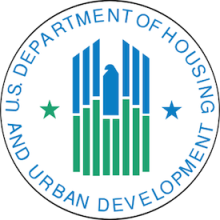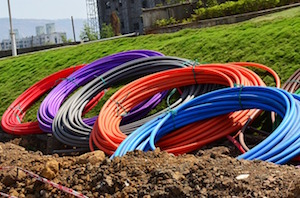
Fast, affordable Internet access for all.

The U.S. Department of Housing and Urban Development (HUD) recently asked for comments about a proposed rule to expand low-income access to high-speed Internet. The regulations would require building owners to install high-speed Internet infrastructure in HUD-funded multi-family rental housing during new construction or substantial rehabilitation, improving Internet access by promoting competition. Because the Internet infrastructure is not owned by one company, many Internet Service Providers (ISPs) can compete to provide residents with better options.
A variety of individuals and groups provided feedback for HUD, including local governments, nonprofit advocacy groups, ISPs, and professional associations. The majority of comments support HUD’s proposed rule, with many encouraging HUD to go further in their efforts to close the digital divide.
We submitted comments with Next Century Cities to articulate the importance of having reliable Internet access in the home:
Although Internet access may be available at schools, libraries, and other locations away from home, families with children - in particular single-parent households - face barriers to accessing those facilities. There is no substitute for having high quality home Internet access, where all members of a household can use it with privacy, security, and convenience. This high quality Internet access is what our organizations work with mayors and local leaders to achieve for residents and businesses everyday, which is why we feel so strongly about the proposed steps to close the digital divide and allow more residents to connect online.
HUD correctly notes that installing telecommunications equipment during major rehabilitations or as units are being built creates an opportunity to ensure high quality access without significantly adding cost to the project. The ongoing benefits from high quality Internet access certainly dwarf the one-time low cost of installing appropriate technology. --Next Century Cities and the Institute for Local Self-Reliance
Promote Competition
Google Fiber discusses the importance of infrastructure to access, suggesting that HUD could take further steps to ensure choices are available to multi-family housing residents:
...HUD should expressly prohibit the public housing agencies (PHAs) and landlords supported by its programs from unreasonably interfering with the right of any multifamily rental housing resident to request or receive installation, operation, maintenance, or removal of a broadband service from a provider. --Google Fiber
Comments submitted by Eric Null highlight the benefits of open access networks for lower-income families who are forced to pay high rates when there is no competition. Null’s submission represents the comments of several public interest groups including New America’s Open Technology Institute, New America’s Resilient Communities Project, New America’s Education Policy Program, Benton Foundation, Center for Rural Strategies, National Hispanic Media Coalition, and Public Knowledge:
Open access networks are critical in traditionally underserved areas where a dearth of choice has led to higher prices and fewer choices for consumers. Allowing any internet service provider to service new and substantially renovated buildings would increase the number of competitors and lower the barriers to entry for new providers, forcing providers to compete for customers by reducing pricing and improving offerings. --Eric Null, on behalf of several public interest groups

The City of Seattle also highlights how infrastructure can support competition and discusses ways to provide quality, reasonably priced service:
Local housing providers should be enabled with options to provide the best, lowest cost service to residents as possible. The two primary means to do this are to 1) enable multiple competitive providers, or 2) enable the housing provider and residents to aggregate purchasing and delivery of service. To do this there either needs to be sufficient conduit and wiring from the entry point to each unit, or to a central distribution managed distribution system where either a single best provider can be selected or multiple providers can offer service through the building distribution system. --City of Seattle
Encourage Fiber For Future-Proof Connectivity
The National Association for County Community and Economic Development’s comments about the proposed rule suggest HUD encourage fiber service and negotiate with ISPs for service agreements:
When requiring the build-out of broadband infrastructure in HUD-funded multifamily rental housing the agency should seek methods to incentivize the highest level of broadband service, such as fiber service, to ensure the ability to keep pace with the increasing needs of connection speeds… we believe a significant opportunity exists to utilize HUD’s negotiating power to secure competitive broadband service agreements from providers. Aggregating demand among HUD-funded buildings and properties could potentially yield lower service rates for low- and moderate-income renters. --National Association for County Community and Economic Development
Funding
Comments from The National Housing Conference encourage HUD to consider broadband infrastructure to be an eligible expense for multifamily affordable housing developments:
HUD has made good strides in clarifying that broadband is an eligible expense, like the recent guidance on broadband in HOME, CDBG, and the National Housing Trust Fund. HUD should continue these efforts for all multifamily development programs. Building on these initial steps, HUD should explore treating cost-effective basic broadband as a standard operating cost for affordable housing properties... Put more simply, if use of a program requires a property to install broadband infrastructure, the funds provided by that program should also be allowed to cover the cost. --National Housing Conference
Other comments support HUD’s interest in Internet expansion, but disagree with the way in which HUD is promoting low-income access. A few Public Housing Authorities and professional associations state their concerns with HUD creating an unfunded mandate; however, the estimated cost for broadband infrastructure is only $200 per unit and the construction occurs during significant rehabilitation or new construction.
To read full comments from organizations listed above as well as other comments, view the docket here.
